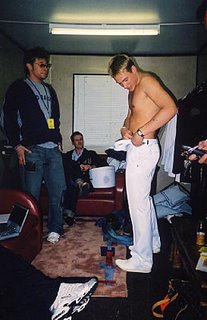It is, to be fair, a sign of Coldplay's desperate need to be thought of as good-ish blokes that the band try to keep the ticket prices for their gigs down to fairly low levels. Although the £35-ish tickets for a gig in Las Vegas still make the evening come in at well over £100 for a night out for a couple by the time you add in travel, which is still quite hefty. Anyway, their bid to keep prices at silly rather than totally stupid has, of course, been thwarted by people sticking them for sale on Ebay. In The Sun, Victoria Newton is outraged:
I think it is an outrage that fans get cheated like this, and it is not just followers of Coldplay who have been caught out.
These days, through sites such as eBay, it is getting easier to flog tickets for daft prices.
Perhaps the way forward is to handle ticket sales like organisers of the Glastonbury Festival do, where only two are allowed per buyer.
The Glasto scheme is enforced by a strict ID policy.
Is your outrage endorsed by your editor and publisher, Ms Newton? Only isn't the work of the tout - buying up rights and then charging fans through the nose so that they can see the people they made successful in the first place - pretty much, say, what your boss Rupert Murdoch did when he took First Division football (and international cricket, and semi-naked wet sponge racing) off onto Sky?
And surely, the red-blooded sight of capitalism in full cry - everything to the highest bidder - is exactly what The Sun stands for in all other fields? We'd have thought you'd have approved of this smart use of scarce resources by the rich - pay someone else to buy your tickets for you.
Anyway, it's good to hear that The Sun has finally started to see the value in Socialism; politics the same colour as your masthead at long last, eh?
Seriously, the Glastonbury model is a rubbish idea - apart from anything, all that does is create a secondary ebay market in false ID, at the same time as adding a frightful level of bureaucratic faffing to be done, forcing up the price of the tickets you were supposedly keeping semi-affordable in the first place. And while Glastonbury-goers arrive over a period of about 48 hours, how on earth do you check 17,000 tickets on the door of a venue in the hour or so during which everyone turns up? Half a moment's thought would have shown that this was an idea that wouldn't actually work.
If something must be done, there are a couple of ways. First is to adapt the system used by my local cinema. I buy and pay for my tickets, then pick them up at the cinema by swiping my card through a machine. Now, the logisitics of having 17,000 people do this in one place at one time are as insane as Victoria Newton's idea, but there is another way - you could link up with a place with a number of outlets: a store chain, or a petrol company. You buy your tickets upfront, online, in the normal way, but don't receive them until 24 Hours before the doors open - you just get a blank sheet for each ticket. Then, you go to your nearest Texaco or Tesco or wherever, pass your blank ticket and card you used to pay over to the assistant. They swipe the card, which checks that the card has had tickets purchased on it, insert the blank ticket into their usual printing device, and your ticket is printed.
It's too late to go and sell the tickets online, as the doors open within the day; you could have sold the blank ticket, but you would also have had to provided not just ID but the actual card you bought the tickets with to the person who bought it before they could get hold of them - and who's going to sell their own credit card on Ebay? But people are still free to swap tickets with friends and even sell them to a mate from the office or whatever if they can't get to the gig any more. And because anyone can go to any branch of the chain store to get their tickets in a 24 hour period, there's not going to be a crush at any one place, at one time as people stuggle to get in to the venue.
Yes, you'd have to pay a small fee to the store for use of their facilities - but what shop is going to turn down, say, a one pound fee for something which brings people into their stores? There'd be no need to introduce new infrastructure, it could all run on existing systems.
Actually, you could get the lottery to do it, come to think of it, so you could pick up your tickets anywhere the National Lottery operated. (They did that, of course, with the Millennium Dome, although the difference here is we're talking about an event people might want to go to.)
The other option? If you don't want fans to be scalped by people flogging tickets on Ebay, do it yourself. If all 17,000 tickets had been sold through the site, perhaps being done in tranches of 1,000 at a time, the wider supply would have held down prices. Yes, everybody would have ended up paying a bit more, but the band could give that to charity or even give out the surplus to a lucky punter as a raffle prize at the gig.
It's disappointing that the only reaction to a modern problem is to decide that we must continue to use the old methods, but just make people prove who they are before they can go about their business. Technology is a tool, not a threat.




 We were going to headline this 'what do I do now', but using a Sleeper song on a Garbage news item would have felt like we were just lumping all the female fronted bands together. Anyway, it's the question that
We were going to headline this 'what do I do now', but using a Sleeper song on a Garbage news item would have felt like we were just lumping all the female fronted bands together. Anyway, it's the question that  If you have to sound like the things you were listening to four years ago, there are worse things to sound like. Get hold of the album before they disappear
If you have to sound like the things you were listening to four years ago, there are worse things to sound like. Get hold of the album before they disappear Ooh, he's quite the charmer, isn't he? It's doubtful that Sting - yes, it's Sting, not the bloke who pushes the trolleys in the Co-op Leos - really was passing judgement on Jennifer Aniston's new movie here, although the picture was taken at the premiere. (We don't know why they bothered with a premiere - by now, they must have learned that Jennifer Aniston movies are best promoted with a "2 for 1" deal in your local newsagent's ex-rental DVD dumpbin.) But Sting would never be so rude about a fellow artiste's movies. Not with The Observer giving away Dune this weekend.
Ooh, he's quite the charmer, isn't he? It's doubtful that Sting - yes, it's Sting, not the bloke who pushes the trolleys in the Co-op Leos - really was passing judgement on Jennifer Aniston's new movie here, although the picture was taken at the premiere. (We don't know why they bothered with a premiere - by now, they must have learned that Jennifer Aniston movies are best promoted with a "2 for 1" deal in your local newsagent's ex-rental DVD dumpbin.) But Sting would never be so rude about a fellow artiste's movies. Not with The Observer giving away Dune this weekend. In a bumbling attempt to try and take interest away from all those rumours that he's about to be dropped by his label, Lee Ryan managed to blurt out news about a pregnancy on live radio yesterday. He was on Suzie McGuire's Clyde1 show and after telling her she had "a real glow" then trumpeted "I hear you've got good news - another bun in the oven." A real glow? A bun in the oven? Can you actually only get Lee Ryan in black and white, or is it just the thought of women and reproduction that turns him into Terry-Thomas?
In a bumbling attempt to try and take interest away from all those rumours that he's about to be dropped by his label, Lee Ryan managed to blurt out news about a pregnancy on live radio yesterday. He was on Suzie McGuire's Clyde1 show and after telling her she had "a real glow" then trumpeted "I hear you've got good news - another bun in the oven." A real glow? A bun in the oven? Can you actually only get Lee Ryan in black and white, or is it just the thought of women and reproduction that turns him into Terry-Thomas? Haven't Tatu already dumped their manager once? Only they've done it again, so grumpy at being booked on some sort of reality TV show they
Haven't Tatu already dumped their manager once? Only they've done it again, so grumpy at being booked on some sort of reality TV show they 
 The entire Depeche Mode back catalogue is getting a
The entire Depeche Mode back catalogue is getting a  Meanwhile,
Meanwhile,  Victoria Beckham has given her top tips for pulling blokes - all you need to do is pull on a pair of skintight jeans and a pair of high heels.
Victoria Beckham has given her top tips for pulling blokes - all you need to do is pull on a pair of skintight jeans and a pair of high heels. Madonna has put her foot down - yes, we know, who ever thought Madonna would come over all insisting? - and
Madonna has put her foot down - yes, we know, who ever thought Madonna would come over all insisting? - and  We're sure Madonna's just keen to make sure that her daughter doesn't find herself centre of attention when her mother isn't there to protect her by soaking up all that attention herself. What a wonderful mother.
We're sure Madonna's just keen to make sure that her daughter doesn't find herself centre of attention when her mother isn't there to protect her by soaking up all that attention herself. What a wonderful mother.



